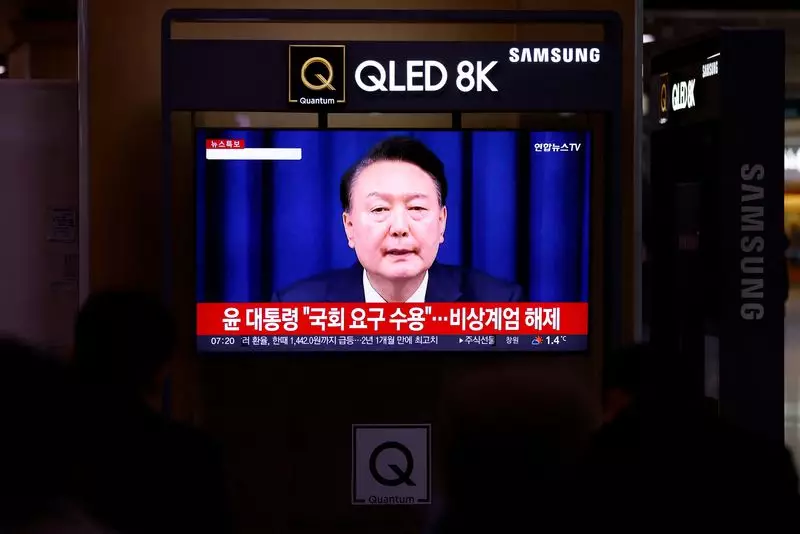The unfolding political drama in South Korea has sent ripples through its financial markets, characterized by sharp declines in the stock market and a depreciating currency. As lawmakers initiate steps towards the impeachment of President Yoon Suk Yeol, the recent declaration of martial law—later retracted—has stirred uncertainty among investors and market participants alike. This article dissects the implications of this political crisis and the ensuing market reactions, providing insights from several market analysts.
On Wednesday, South Korea’s benchmark Kospi Index experienced a substantial dip, shedding nearly 2% as the shockwaves from the political crisis reverberated through the market. Concurrently, the Korean won hit a two-year low before showing signs of stabilization. Such volatility highlights the broader sentiments that shroud the South Korean economy, where a simple political misstep can trigger widespread financial ramifications. The rapid selloff underscores the fragile state of investor confidence, already burdened by ongoing concerns over domestic demand and regional geopolitical tensions.
Key analysts have characterized this political situation as a gamble that has backfired, with several stating their reluctance to invest further into South Korea amidst heightened uncertainty. SAT DUHRA, a portfolio manager at Asia Dividend Income, described the current scenario as fraught with risk—not just for the won but for all Korean assets. Despite the market being considered attractive, the overarching instability is making many investors think twice about their commitments in the region.
The notion of the ‘Korea discount’—where South Korean assets trade at lower valuations compared to their global counterparts—has gained traction as a result of this political unrest. DANIEL TAN from Grasshopper Asset Management pointed out that the episode could further exacerbate this risk premium. In fact, South Korea’s KOSPI index is trading at a mere 0.8 times its forward estimated book value, in stark contrast to the MSCI World Index, which stands at approximately 3 times. This discrepancy illustrates the wariness among investors who might demand even higher premiums for potential risks associated with investing in South Korea, particularly in light of an impending Trump administration.
The potential for an economic downturn due to disrupted international relations or trade policies under a new U.S. administration adds an additional layer of complexity. Thus, despite attractive valuations, many analysts express a preference for markets like China that appear more stable under the current geopolitical climate.
Looking ahead, several analysts have commented on the potential long-term effects of the political crisis on South Korea’s economy. Robert Carnell from ING expressed skepticism regarding domestic demand, predicting that the Bank of Korea (BOK) would be compelled to adopt more accommodative monetary policies. The added political unrest only serves to accentuate the existing economic vulnerabilities.
Frances Cheung from OCBC Bank offered a nuanced view, suggesting that while the martial law episode created immediate volatility, the broader financial landscape would remain resilient if currency stability was maintained. This perspective indicates that while short-term shocks may surface, the long-term economic fabric of South Korea could withstand transient political turmoil—as long as fundamental economic indicators remain sound.
However, David Chao from Invesco cautioned that market volatility might persist in the near term, urging investors to remain vigilant. According to Chao, while the political crisis may appear as a fleeting blip, the fear of extended instability could keep markets on edge.
In moments of political turbulence, the sentiment among market participants often sways dramatically. Analysts like Linda Lam from UBP advocate for a cautious approach regarding emerging market investments, specifically emphasizing the interplay of tariff and currency fluctuations, particularly under a potentially disruptive Trump administration.
Even amidst the chaos, some strategists find silver linings; they suggest that with the BOK pledging to maintain liquidity and support for the financial system, it’s plausible that the market could stabilize. However, the question remains whether investors will regain their confidence in the South Korean markets as they grapple with both domestic and international uncertainties.
Thus, the confluence of political crises, currency fluctuations, and global economic indicators suggests a challenging atmosphere for South Korean investments moving forward. As analysts continue to assess this dynamic situation, investors must remain agile and aware of both immediate and long-term implications for their portfolios.

